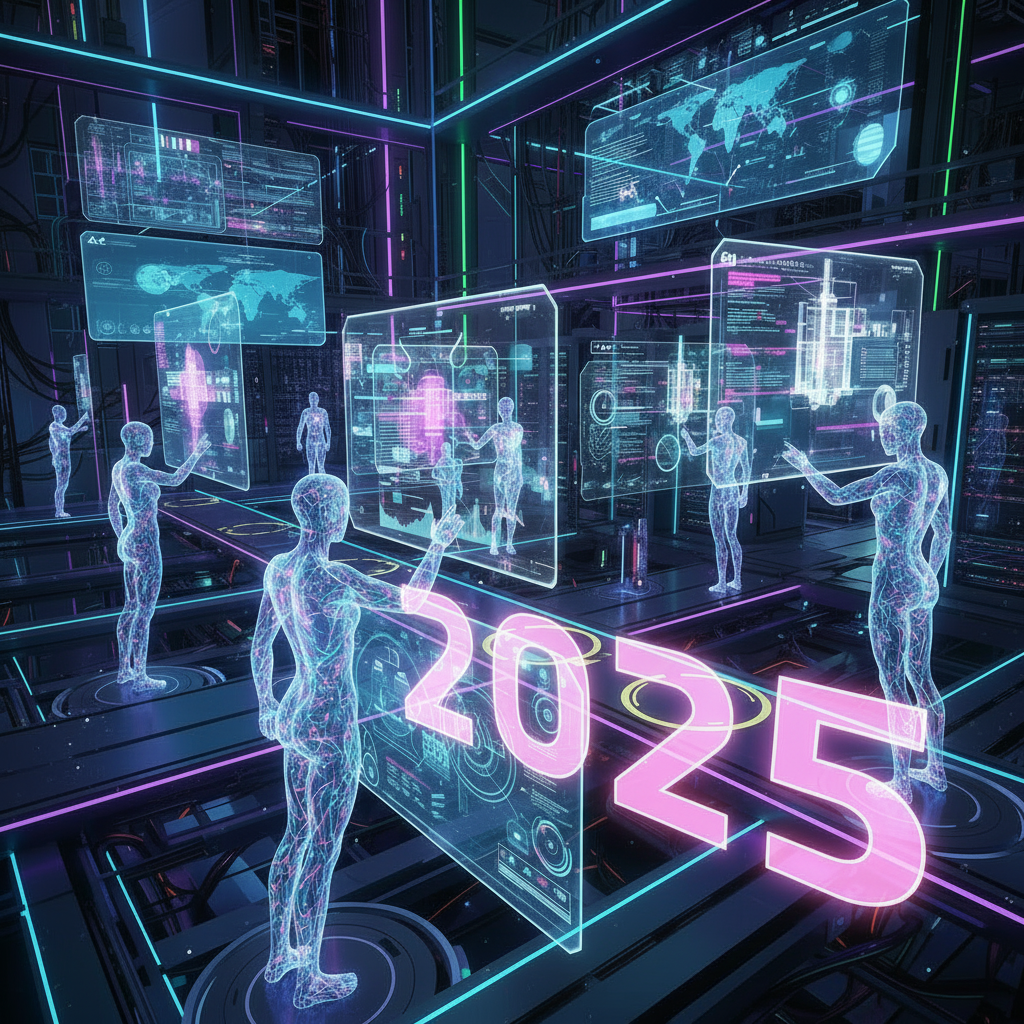Imagine having an AI assistant that doesn't just answer questions but actually takes meaningful action to solve your business challenges. While traditional chatbots provide predetermined responses to common inquiries, a new generation of AI technology is emerging that can think critically, make decisions, and execute complex tasks autonomously.
This breakthrough is called agentic AI.
The shift from reactive AI tools to proactive, action-oriented systems represents a fundamental evolution in artificial intelligence applications. With agentic AI's ability to anticipate needs, initiate solutions, and continuously learn from interactions in a wide variety of use cases, it's a tool organizations should heavily consider including in their AI strategy.
This blog post will go over:
What Agentic AI Is What makes it different from traditional chatbots Some example use cases of agentic AI Let's dive in!
What is Agentic AI? Unlike conventional AI tools that require explicit instructions for every task, agentic AI refers to systems that have the capability to understand objectives, develop strategies, and execute multi-step processes independently.
These intelligent systems combine several advanced AI technologies:
Natural Language Understanding : Comprehends complex requests and contextual nuances in human communicationDecision-Making Capabilities : Evaluates multiple options and selects optimal solutions based on defined parametersAction Execution : Performs tasks across various systems and platforms without constant human interventionLearning and Adaptation : Continuously improves performance through experience and feedbackThe "agentic" aspect refers to the system's ability to act as an autonomous agent with specific goals and the intelligence to pursue those goals through independent reasoning and action. This creates AI systems that function more like skilled team members rather than simple tools.
What Makes Agentic AI Different from a Traditional Chatbot? While they may be similar at first place, the differences between agentic AI and traditional chatbots are vast.
Traditional Chatbots: Reactive Response Systems Traditional chatbots and FAQ bots operate on predetermined decision trees and scripted responses.
That means their functionality is inherently limited by their programming constraints.
Characteristics of Traditional Chatbots:
Static Knowledge Base : Relies on pre-programmed responses and cannot adapt beyond initial configurationLinear Conversation Flow : Follows predetermined paths with limited ability to handle unexpected queriesSingle-Purpose Functionality : Designed for specific tasks like answering FAQs or collecting basic informationHuman Escalation Dependency : Requires human intervention for complex or unusual requestsAgentic AI: Dynamic Action-Oriented Systems Agentic AI systems operate with sophisticated reasoning capabilities that enable autonomous decision-making and task execution. These systems understand context, evaluate options, and take appropriate actions to achieve desired outcomes.
Advanced Capabilities of Agentic AI:
Dynamic Problem-Solving : Analyzes unique situations and develops customized solutions in real-timeCross-Platform Integration : Accesses multiple systems simultaneously to gather information and execute tasksContextual Memory : Maintains awareness of previous interactions and ongoing processesAutonomous Task Completion : Executes multi-step workflows without constant human guidancePractical Comparison Example Consider a customer service scenario where a client reports a billing discrepancy:
Traditional Chatbot Response:
"I understand you have a billing question. Let me transfer you to our billing department. Please hold while I connect you with an agent."
Agentic AI Response:
The system automatically accesses the customer's account, reviews recent transactions, identifies the discrepancy, cross-references with service records, calculates the correct amount, processes the adjustment, sends a confirmation email, and provides the customer with a detailed explanation of the resolution, all within minutes of the initial inquiry.
Industry Applications: Agentic AI Transforming Business Operations Agentic AI implementation spans multiple industries, delivering measurable improvements in efficiency, accuracy, and customer satisfaction. Organizations leverage these systems to automate complex processes while maintaining high service quality standards.
Manufacturing: Intelligent Operations Management Manufacturing environments benefit significantly from agentic AI's ability to monitor complex systems and coordinate multiple processes simultaneously.
Equipment Maintenance Copilot To keep factory workers informed of equipment health, manufacturing businesses can train an AI Agent on maintenance logs so field workers can look them up and receive guidance on how to maintain and fix machines while running plant operations. Workers can also use the agent to create and send service tickets for high-priority issues.
Supply Chain Coordination These intelligent systems manage inventory levels by analyzing consumption patterns, lead times, and supplier performance. They automatically generate purchase orders, negotiate delivery schedules with vendors, and coordinate cross-departmental logistics to prevent stockouts and minimize carrying costs.
Quality Control Automation Agentic AI integrates with inspection systems to identify product defects and automatically route affected items for rework or disposal. The system simultaneously analyzes defect patterns to identify root causes and implements corrective measures to prevent recurrence.
Construction: Project Management and Compliance The construction industry leverages agentic AI to manage complex projects involving multiple stakeholders, regulatory requirements, and resource coordination challenges.
AI Safety Agents Construction workers have to ensure projects adhere to numerous local, state, and federal regulations, often spanning thousands of pages. Agentic AI tools can ingest all this material so workers can search it easily, saving hundreds of hours on safety information recall and reducing injury rates.
Resource Optimization These systems coordinate equipment schedules, material deliveries, and workforce deployment to minimize delays and cost overruns. When weather or other factors impact project timelines, agentic AI automatically adjusts schedules, notifies affected parties, and implements contingency plans.
Safety Protocol Enforcement Agentic AI can monitor job sites through IoT sensors and camera systems, identifying potential safety hazards and automatically implementing protective measures. The system generates real-time alerts, coordinates emergency responses, and maintains comprehensive safety documentation for regulatory compliance.
Local Government: Citizen Services and Administrative Efficiency Municipal governments utilize agentic AI to improve citizen services while reducing administrative overhead and response times.
Permit Processing Automation Citizens can submit permit applications through various channels, with agentic AI systems automatically reviewing submissions for completeness, checking compliance requirements, coordinating interdepartmental reviews, and issuing approvals or requesting additional information. This reduces processing times from weeks to days while maintaining regulatory compliance.
Public Works Management These systems monitor infrastructure through sensor networks, automatically scheduling maintenance based on usage patterns and condition assessments. When citizens report issues like potholes or streetlight outages, agentic AI creates work orders, assigns appropriate crews, and provides status updates to residents.
AI 311 During non-emergencies, like a pothole being found, constituents can use an AI 311 agent to file a service ticket. The agent will immediately identify similar requests and assign the ticket to available personnel, saving time and money on ticket creation and assignment.
Telecommunications: Network Management and Customer Service Telecom companies deploy agentic AI to manage complex network infrastructures while delivering superior customer experiences.
Field Service Management For field workers who are repairing customer networks, they can make use of an AI Agent to ask questions about certain procedures, update their status log, and file service tickets to their office, reducing frustration between field operations and office staff and saving time and money.
Automated Customer Service When customers experience service issues, agentic AI systems can access account information, diagnose problems through network analysis, implement solutions remotely, and follow up to ensure resolution satisfaction. This approach resolves many issues without human intervention while providing personalized service experiences.
Infrastructure Planning These systems analyze usage patterns, demographic trends, and technology adoption rates to predict capacity requirements and automatically initiate infrastructure expansion projects, coordinating with engineering teams and regulatory agencies to ensure timely deployment.
Healthcare: Patient Care and Administrative Support Healthcare organizations implement agentic AI to improve patient outcomes while reducing administrative burdens on medical professionals.
Patient Care Coordination Agentic AI systems manage appointment schedules, coordinate care between specialists, monitor treatment compliance, and automatically adjust care plans based on patient progress. These systems ensure continuity of care while reducing administrative overhead for medical staff.
Medical Records Management These systems automatically update patient records, coordinate information sharing between healthcare providers, and ensure compliance with privacy regulations while maintaining comprehensive medical histories for informed decision-making.
Financial Services: Risk Management and Customer Support Financial institutions leverage agentic AI for fraud detection, compliance management, and personalized customer service delivery.
Automated Compliance Monitoring These systems continuously monitor transactions and account activities for regulatory compliance, automatically filing required reports, flagging suspicious activities, and coordinating with compliance teams to address potential issues before they become violations.
Personalized Financial Advisory Agentic AI analyzes customer financial situations, market conditions, and investment goals to provide personalized recommendations, automatically rebalancing portfolios, and coordinating with financial advisors for complex decision-making.
Getting Started: Transform Your Operations with Symphona Converse The transition to agentic AI represents a strategic opportunity for organizations to achieve unprecedented levels of operational efficiency and customer satisfaction. Within Symphona by SimplyAsk Symphona Converse
Symphona Converse enables organizations to build intelligent AI agents that understand context, make autonomous decisions, and execute complex workflows across multiple systems. These agents integrate seamlessly with existing business processes while providing the flexibility to adapt as organizational needs evolve.
Key Benefits of Symphona Converse:
No-Code Development : Create sophisticated AI agents without programming knowledge or technical expertiseRapid Deployment : Implement functional AI agents in days rather than monthsScalable Architecture : Support growing operational demands with enterprise-grade infrastructureIntegration Capabilities : Connect with existing systems and databases for comprehensive automationReady to experience the transformative power of agentic AI? Symphona enables you to optimize your operations with AI automation, from enhancing customer service conversations to eliminating repetitive manual tasks, all without writing a single line of code. Get started with Symphona today
.svg)

.svg)


.svg)





.avif)
.avif)





.svg)
.jpg)






.svg)

.svg)
.svg)
